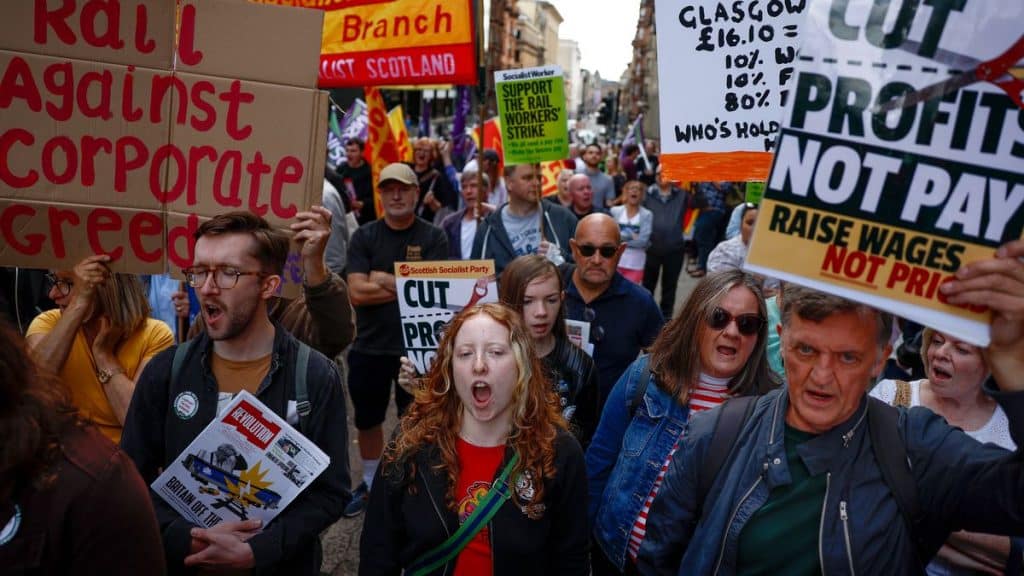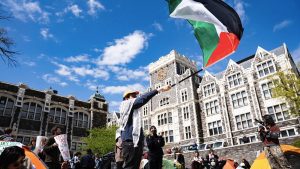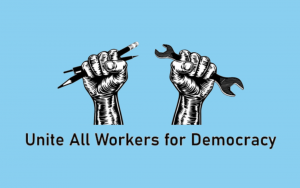Just six weeks after taking office, Liz Truss resigned as head of the Conservative Party, the third UK prime minister to step down in as many years. In recent weeks, a growing number of Tory ministers had been calling on her to resign following the economic turmoil set off by her proposed economic adjustment plan. The final blow to the Truss regime came with the one-two punch of her sacking her finance minister and close ally, Kwasi Kwarteng, and receiving the resignation of Home Minister Suella Braverman. Although she had vowed to stay and fight, quoting the architect of Tony Blair’s neoliberal reign and saying she was not a quitter but a fighter, the chips were hard to consolidate.
How Did We Get Here?
Following Prime Minister Boris Johnson’s resignation on a slew of ethics violations, Truss was selected as PM by the Tory majority, inheriting a regime that is in deep economic, social, and political crisis. For Britain, the organic crisis that began with Brexit has only deepened in the years that followed, especially with a slow post-pandemic recovery and the war in Ukraine, which has deepened inflation and the cost of living crisis, mobilizing hundreds of thousands in workplaces and in the streets. Taking office only a couple of days prior to Queen Elizabeth’s death, Truss represented the return of Thatcherism — of using the classic tools of neoliberalism to quell the economic and social unrest marring Britain. In just a few short weeks, however, her proposed plans exacerbated the very problems she promised to fix, which culminated in last week’s theater.
For Truss, the key to solving the economic crisis — as was the case with Thatcher, Reagan, and other champions of neoliberalism — was to lower taxes on the rich and deregulate the economy which would, in turn, encourage capital investment in a “trickle down” effect. On September 26, Kwarteng announced a “mini budget” which offered around £45 billion ($50 billion) in corporate, income, and payroll tax cuts to the wealthy, and £60 billion ($67 billion) in energy spending support. This move sparked concern — even from the IMF — that with no way to pay for these tax cuts, public borrowing would increase and ultimately worsen the Britain’s cost of living crisis. The markets reacted poorly to the decision: soon after it was announced, the pound plummeted in value, experiencing its biggest single-day drop since March 2020. In order to control this spiraling crash, the Bank of England intervened to rescue the pension funds and avoid bankruptcy.
Given the reaction of the markets, Truss withdrew the plan and backed away from the tax cuts — but the damage had already been done. The failure of the economic adjustment plan had reopened a crisis within the Conservative Party, with a sector of the party pursuing a vote of no confidence against the Truss administration. Kwarteng and Braverman’s departures were the final blow. Now, as Truss is out, many across the different factions of the Tory party are vying to be nominated and selected for the top position, while the Labour Party under the leadership of Keir Starmer is calling for early elections.
A Britain in Turmoil
The crisis of the political regime must be seen in the larger context of the crisis of neoliberalism post-2008 and the organic crisis that opened in the UK over six years ago with the triumph of Brexit.
The crisis of 2008 opened a structural crisis for capitalism the world over, especially in imperialist cores such as the U.S. and UK where neoliberalism was most successful. In the 1980s, Thatcher, with a mantra of “free economy and strong state,” advanced a period of neoliberal growth that was based on the strategic defeat of the British working class, most notably through the state’s defeat of the 1984 miners’ strike. Over the next years, until she was ousted in 1990, Thatcher would promote free enterprise, implementing huge public spending cuts and privatizing many state-owned industries.
Even after her retreat, neoliberalism as an ideology continued to flourish, and the successive Labour government under Tony Blair advanced and intensified much of Thatcher’s policies in the economic arena. These decades marked the destruction of the post-war British welfare state and a liberalization of the economy, complete with the privatization of key industries, including the Royal Mail.
But this cycle of accumulation began to show signs of exhaustion by 2008. The Great Recession marked the biggest economic crisis since the Great Depression. The state responded by bailing out the rich while leaving the working class to dry. In the UK, as in the rest of the world, this meant austerity for working people, while bailouts and stimulus were given to save banks and institutions deemed too big to fail. In the period since, neoliberalism has been unable to find satisfactory motors of growth, especially as productivity has struggled to reach pre-2008 levels. Although unemployment has been low, wages have failed to keep up with inflation, which is having devastating consequences now for the working class.
The inability of the regime to find a way out of this crisis created the conditions for Brexit and the social, economic, and political crises that have plagued the UK since. As even former Labour MP Alistair Darling noted, “I don’t think Brexit would have happened if it hadn’t been for the political and economic events of the proceeding 10 years. People were disillusioned. They felt badly treated. They felt squeezed.” Led largely by right-wing and far-right forces, the Leave campaign’s victory exposed the deep polarization — political, economic, social, geographic, and cultural — that had developed during the decades of neoliberalism.
But, as we continue to see, the organic crisis that began with Brexit is yet to be resolved, especially as the structural crisis continues to deepen in a post-pandemic era. The regime not only has to grapple with the political and economic consequences of leaving the European Union, facing the possibility of a trade war with the EU over the status of Northern Ireland — it is also experiencing a labor shortage due to restrictions on freedom of movement. These economic and geopolitical challenges have been further exacerbated by the consequences of a pandemic that have wrought global supply chains and have made economic recovery particularly hard, as well as a war in Ukraine which has steeply driven up energy prices. All these factors together have created an unprecedented cost of living crisis in the UK: inflation is almost at 10 percent, and energy and food prices are through the roof. The crisis of the Truss administration only marks the latest chapter in a longer period of turmoil for the regime, one with deep roots in the crisis of neoliberalism.
The Working Class on the Scene
Most notably, this chapter of social, economic, political crises is happening against the backdrop of increased activity among the masses and especially in the ranks of organized labor, the likes of which it hasn’t been seen since the Thatcher years. In what was dubbed the “summer of discontent,” workers across key sectors such as logistics, transport, healthcare, and education have gone on strike to demand better conditions as well as wages that keep up with inflation.
Although interrupted by Queen Elizabeth’s passing and the period of mourning, workers have since picked up rumblings of strike activity to fight against decades of austerity. In recent days, over 400,000 healthcare workers have begun to vote for a strike authorization that could see one of the biggest healthcare workers’ strike in the UK since the 80s. Rail workers with the RMT who had struck earlier in the summer are gearing up for another strike in the next month, and are getting ready to fight the state’s intervention to keep minimum rail service running during the time. Notably, unions are now pressuring the Trade Union Congress (TUC) to call for coordinated strike activities across sectors going into this winter.
This is happening while hundreds of thousands across the country have also ramped up the fight against inflation. Over 200,000 people signed a petition with the Don’t Pay UK campaign calling for a national boycott of the payment of consumer energy bills going into winter to protest against the astronomical energy prices. And earlier this month, hundreds of thousands mobilized nationally for a day of action as part of the Enough is Enough campaign geared towards addressing the cost of living crisis.
Following Truss’s departure, many scenarios emerge for the future of the ruling Conservative Party and, by extension, the regime. Several challengers have already lined up as successors, including Rishi Sunak, who came second place to Truss in the last selection, and possibly even Boris Johnson. For any Tory successor, the task of restoring party unity to bring stability to the regime will be central.
Meanwhile, the Labour Party has been attempting to make the most of this crisis. However, while it positions itself as the only solution out of this crisis, it is also positioning itself as the party of Tony Blair, and represents little more than liberalism in a different form. While Labour has always represented a way for the regime to contain the interests of the working class within the bounds of a capitalist, imperialist state, Starmer’s Labour, in particular, is a roadblock for the working class, even as it pretends otherwise.
Since becoming head of the party, Starmer has purged its left wing and consolidated the party around the interests of its right wing, and has no interest in reversing the attacks on the working class. In fact, as strikes broke out over the summer, the Starmer leadership instructed its MPs against going to picket lines in solidarity with striking workers.
For the state, it is going to be essential to manage the political and economic situation whilst containing class struggle as it looks for a way out of this crisis. In this task, both parties of the regime have shown that they are no friends of the working class. Across Britain, however, hundreds of thousands of workers and young people are rising up against the products of decades of neoliberal austerity. With one in seven people skipping meals and almost half the people in the UK cutting back on heating, hot water, and electricity because of the cost of living crisis, workers are redoubling their efforts to win wage increases that keep pace with inflation.
Although still in incipient stages, the working class is entering the scene as a political actor, fighting against the structural crisis with its own methods. For living wages and work conditions, for the right to safe housing, healthcare, and nutrition, and against any form of austerity, it is essential that workers forge and fight with their own independent institutions, continue on the path of class struggle with their own methods, and not pay a single cent for this crisis.











